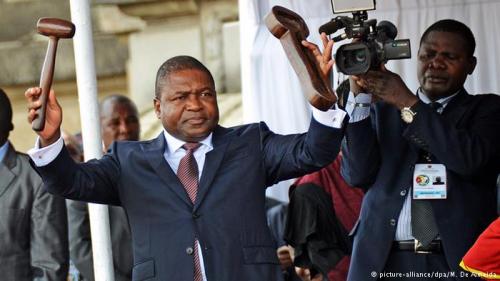
Mozambique is considered as a real success story in Africa. It was a case study on how it is possible to put an end to a bloody civil war.
The narrative goes something like this: a country ravaged by decades long civil war, a proxy conflict of the cold war that had started as soon as freedom was won from its colonial master Portugal, could find peace for good only after decades of heavy civil infighting.
Mozambique throughout its history showed that, a party system aligned to Soviet Union fought by a rebel movement backed by the west, could compromise and bring prosperity to it is people.
With all the effects Mozambique was considered to be a positive case study of peace building. Unfortunately, after two decades of peace, the narrative risks to lose its standing in the history books.
Now peace is at risk in Mozambique. On 15th of January 2015 the third democratically elected president, Filipe Nyusi, was sworn in but, sadly, there is not much to celebrate as the main opposition party, the RENAMO that used to be the rebel force against the one party system led by the ruling FRELIMO party, still in power, is not only rejecting the results but threatens to split the country if its demands are not met.
Unfortunately many were expecting this unfolding of events. The presidential election was held only after long, frustrating negotiations between FRELIMO and RENAMO following in 2013 a return to guerrilla tactics by RENAMO that caused lethal ambushes and attacks on police, army and civilians resulting in dozens of deaths.
A full open civil war was averted but all the leaders of RENAMO emerged from hiding in the bush of the northern part of Mozambique only in September 2014 when a deal with FRELIMO was almost secured. Yet it took lots of negotiations to finalize the final package deal that led to the presidential election in October.
The political settlement that paved the way for the election was a better inclusion of RENAMO in the state institutions, including the army and the police. No one is surprised that FRELIMO won the elections that were also contested by the Mozambique Democratic Movement, MDM who broke up with RENAMO back in 2009. The MDM also rejects the final electoral results.
The new president during his inaugural speech talked about national reconciliation but knowing the politics of a former one state party like RENAMO, there are serious risks that his speech was just an exercise in demagogy and rhetoric with nothing substantial and concrete gestures to reach out the opposition parties that are asking at least for a government of national unity.
More recently the leader of RENAMO and its veteran presidential candidate, Alfonso Dhlakama who has run unsuccessfully for president since the end of the conflict, made provocative statements about dividing the country with his party taking control of the north and center of the country.
Though short of declaring formal independence from the central government, RENAMO is going to do everything possible to sabotage the new administration. More low intensive conflicts will mar the future of the country with risks of gradual escalation.
It will try slowly to take full control of the areas of the country where it is stronger politically and this will certainly invite more confrontations with the FRELIMO. Though improbable at the moment the danger of an escalation in violence and a full conflict cannot be ruled out. The fact that many people died after two decades of peace is just an indicator of how far the two parties can go in destroying the seeds of peace and harmony.
The recent events in Mozambique teach that peace is not irreversible and that long political stalemates like the one that affected Mozambique can be really a threat to the prosperity of a developing nation that did not heal completely from the wounds of the civil war that caused at least one million deaths.
The fact that RENAMO had to go back to guerrilla warfare in order to exercise pressure on the government and successfully force it to negotiate a new political deal before the presidential election, shows the unpredictability of the post conflict political process. It also showed how uncompromising positions by a majority party can bring back instability and conflicts.
The fact that Mozambique discovered at the end of 2011 huge gas reserves did not help. Natural resources as often proved, can be a real curse for poor nations. Is the geopolitics of gas behind the resurgence of RENAMO?
What is the role of the multinational companies investing millions of dollar in natural resources extraction? Surely they are already paying a high price for the current political instability.
The new president needs to show statesmanship skills to bring the two major political parties on board in a broader national coalition.
What is missing in countries in transition is the capacity of moderation and common sense to reach out to the political opposition. Nepal is definitely not Mozambique and the civil conflict here was completely a different story from the one fought there. In Nepal there is no one dominating political party like the massive independence movements of southern Africa who still carry an illiberal and autocratic mindset. The political arena is much more fragmented with three major parties who can compete on an equal basis for power. Yet a culture of compromise eludes the leaders of these three parties. Long vision statesmanship is missing. Mozambique shows that peace should never be taken for granted.










Add new comment